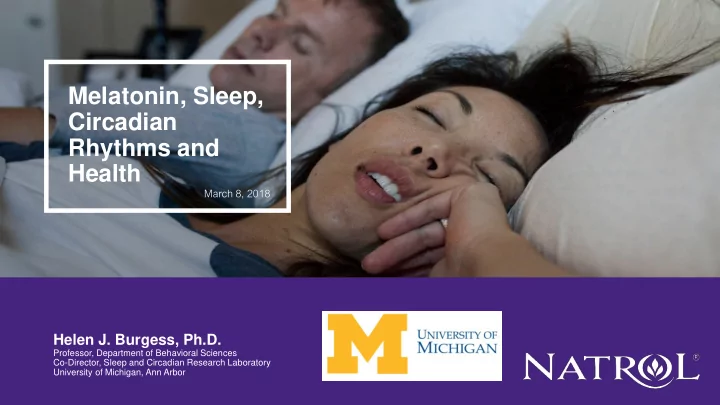

Melatonin, Sleep, Circadian Rhythms and Health March 8, 2018 Helen J. Burgess, Ph.D. Professor, Department of Behavioral Sciences Co-Director, Sleep and Circadian Research Laboratory University of Michigan, Ann Arbor
What is Melatonin? Melatonin is a hormone “of darkness” • A few hours before usual bedtime, the body (circadian) clock triggers the pineal gland to secrete melatonin 2
What is Melatonin? Melatonin is a hormone “of darkness” • Melatonin levels remain high during the night • Melatonin enters the circulation, and signals to the rest of the body that it is now the “biological night” 3
What are the benefits of exogenous melatonin? 1. Melatonin can improve sleep • ~2% of adult population use melatonin as a sleep aid • 3-5 mg taken ~30 min before desired sleep • Melatonin helps you fall asleep faster • Melatonin can improve sleep quality and increase sleep duration • These effects are largest when endogenous melatonin levels are low • Light exposure, alcohol and some medications (e.g. NSAIDs, beta- blockers) are known to partially suppress melatonin 4
What are the benefits of exogenous melatonin? 2. Melatonin can shift the timing of the body (circadian) clock • WHEN you take melatonin is critical • If you take melatonin (pill, liquid) in the afternoon, your clock thinks night has started early – rhythms shift to be earlier • If you take melatonin in the morning, your clock thinks night is still occurring – rhythms shift later 5
What are the benefits of exogenous melatonin? 2. Melatonin can shift the timing of the body (circadian) clock • Many of us need to shift our circadian rhythms a little earlier: • Our clocks have a natural tendency (>24 h) to run late • We tend to get a lot of evening light, and not a lot of morning light 6
What are the benefits of exogenous melatonin? 3. Melatonin is a potent antioxidant • More effective against oxygen free radicals than vitamin E • Lab studies show human breast cancer cells grow more slowly in blood with melatonin vs. without melatonin • Large prospective research studies indicate that people with lower levels of endogenous melatonin are more likely to develop: • Breast cancer • Hypertension • Type 2 diabetes • Light exposure, alcohol and some medications (e.g. NSAIDs, beta-blockers) are known to partially suppress melatonin 10 mg of melatonin before bedtime can increase antioxidant capacity and may have beneficial health effects, but more research is needed 7
CONCLUSIONS • Exogenous melatonin can help to: Improve our sleep Sync our body clock (circadian) time with the timing of our social world • Thereby improving our mental and physical health, making us more resilient to life’s challenges • Exogenous melatonin may also improve our health as an antioxidant…more research on this is needed 8
Thank You! 9
Recommend
More recommend